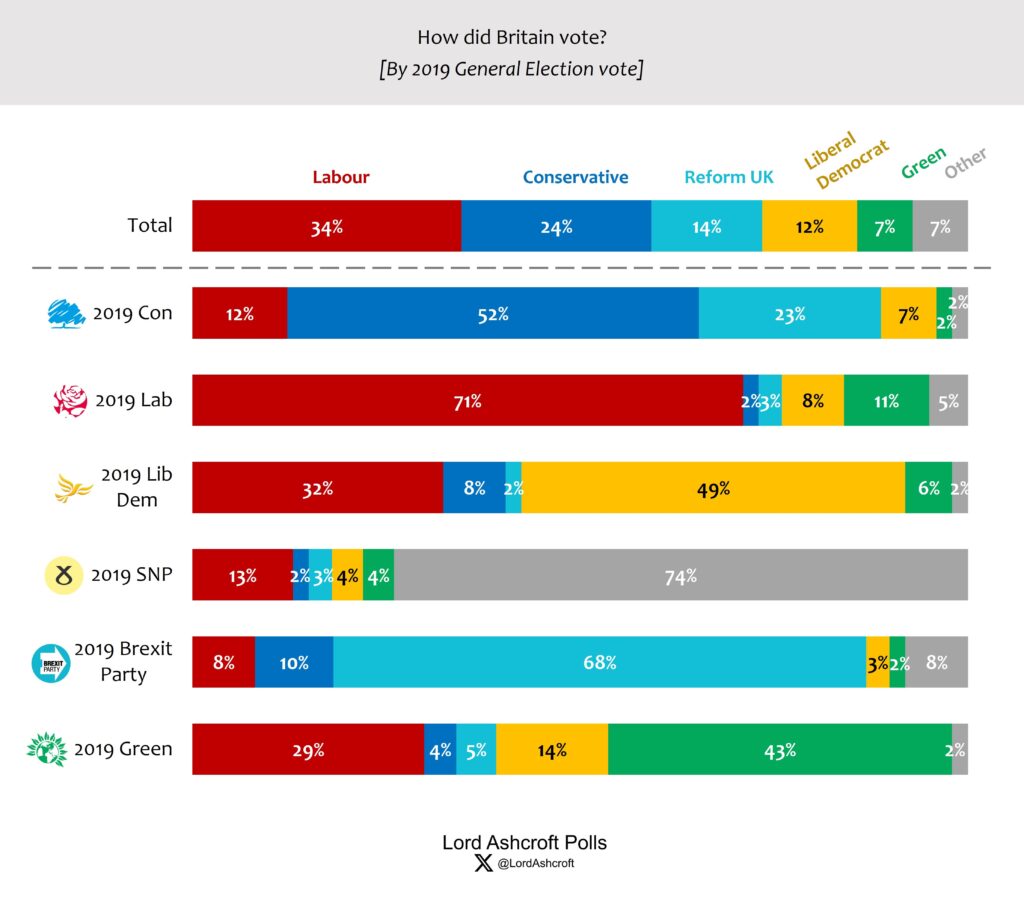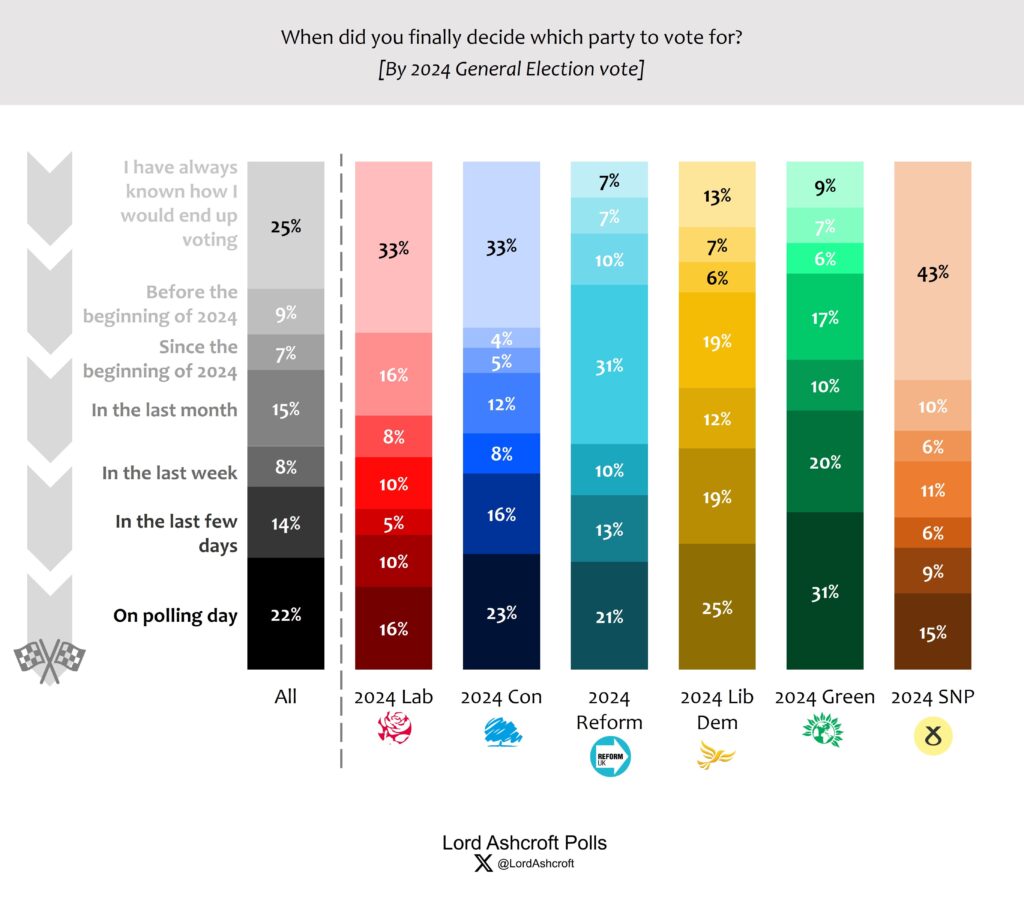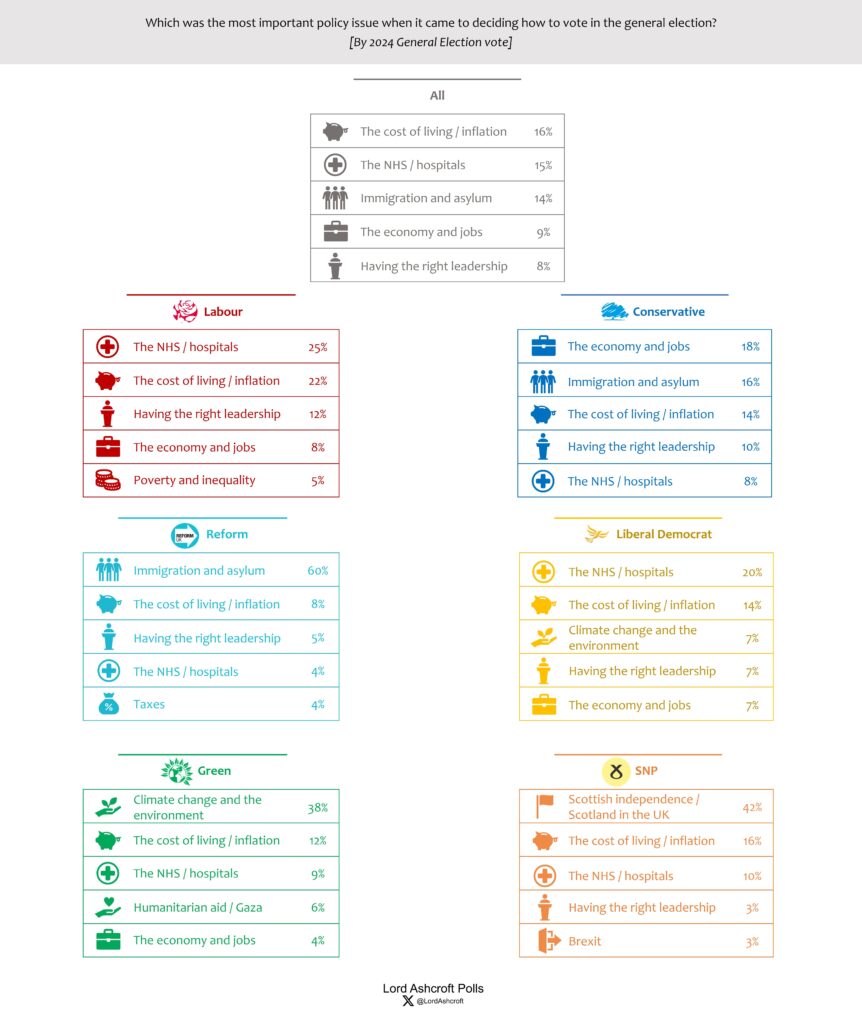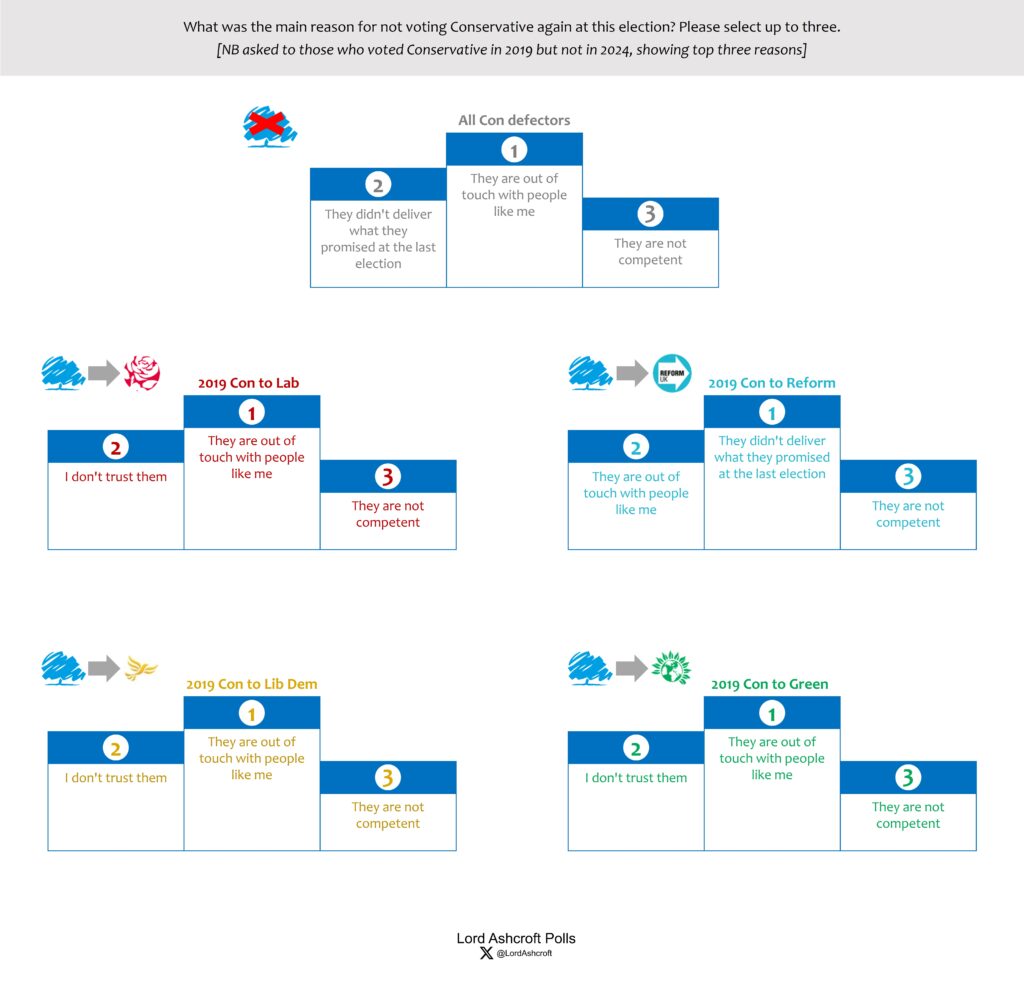-
• #3627
Surely quite a few more permutations here.
Hence:
More could be done after that, but we'd have an idea of what was happening already with that information.
.
Not very convinced that anything very meaningful comes from it.
Why? Possible I'm missing something but it seems like pretty low hanging fruit in terms of a very simple overview of voting behaviour that accounts for Reform.
-
• #3628
This pay off is perfect:
There may be, there will be, disappointments, and perhaps worse, ahead, but today there is something to celebrate. It isn’t simply the defeat of a political party. It is the defeat of a political ethos of gross dishonesty, unforgiveable incompetence, corruption, entitlement, and cruelty. That ethos has degraded our institutions, poisoned our political culture, and debased our international reputation. It gave us Brexit, of course, but it also gave power to mediocrities, dullards, charlatans, fantasists, fanatics, thugs, and liars.
-
• #3629
It seems to be starting from a confirmation bias to start with.
-
• #3630
Eh? What am I trying to confirm? I honesty think you'll find cases where Labour have increased their vote share and cases where Reform have split the vote.
The hypothesis is this: Labour increased it's vote share in seats that previously were Tory.
We can test that really easily by just comparing 2024 vs 2019. (Has labour's percentage gone up in seats previous Tory).
However, we know that 2024 and 2019 are not comparable because Brexit stood down in 2019. Therefore we have to account for that change. This is why you need to include Reform in any calculation.
I'm a bit lost as to what you think I'm actually interested in.
-
• #3631
Yes!
-
• #3632
Bunch of great charts in here on how people voted and why
https://lordashcroftpolls.com/2024/07/how-britain-voted-and-why-my-post-vote-poll/A few examples




-
• #3633
Thanks for that link.
-
• #3634
And seats where greens won or reform Lib Dem’s?
It feels like you are spitting left and right and that any vote here must have come from here because the numbers align?
-
• #3635
Sophy(?) Ridge put to Starmer the other day that if he wanted to do something bold then he would never have as much power as today to do it. Thought it was an interesting point. The honeymoon won't last long.
-
• #3636
I think he showed himself to be stubborn through the campaign also, maybe that will characterise his term as PM.
-
• #3637
For those that enjoy a substack
https://benansell.substack.com/p/morning-after-poll?In all, this is the most disproportionate election in modern British political history. Heinz Brandenburg, the University of Strathclyde political scientist has done the calculations - on the Gallagher index, the standard measure we academics use to describe disproportionality, this election scores 24, beating the previous record of 21 in 1931, an election in which Labour were reduced to a rump 55 seats by the National Coalition. By my reckoning this means the new Parliament will be the fifth most disproportional in the world, after St Lucia, Barbados, the Bahamas, and Bhutan - classic combo.
-
• #3638
And seats where greens won or reform Lib Dem’s?
It's the same thing. You can look at those as well. The question isn't about them though. But the data I want could be used to investigate questions around those parties as well.
Look at the link @greentricky just posted (thanks!). The second figure is essentially what I want to see. It shows movement/change from Tory to Reform and Labour. Cool - I also want to see this at a constituency level - that can offer some insights into the impact of that movement/change. The national level is interesting, but it doesn't answer the question: did this result in a split on the right that got Labour in, or was there enough movement from other parties to Labour to overcome any split.
That is, I want to see the second figure for each constituency not just the national level. I'm not trying to "confirm" anything.
It feels like you are spitting left and right and that any vote here must have come from here because the numbers align?
I don't know what this means. I've already said that we don't know individual voter behaviour. Every analysis is like this.That doesn't mean we don't use aggregated data.
-
• #3639
Welcome
-
• #3640
This is the money.
Very early on Friday morning, Liz Truss, a politician whose weapons-grade inability to read any room almost bankrupted the nation, appeared unable even to choreograph her own demise. The last minutes of her time in office as an MP were as clumsily inept as much of the previous 14 years of vapid careerism.
-
• #3641
does prof curtice? his coalition is broad, not deep, and very unstable
But if the electorate said a firm “No” to the Conservatives on
Thursday, the enthusiasm for Labour was muted. The party won just 35
per cent of the vote, less than Jeremy Corbyn in 2017 and less than
Tony Blair achieved in his three election victories. Indeed, never
before has a party been able to form a majority government on so low a
share of the vote.In combination with the Conservatives’ record low share, this meant
that the share of the vote won by Labour and the Conservatives
combined was the lowest since Labour first became the Conservatives’
principal rivals in 1922. At the same time, turnout fell by eight
points to 60 per cent, the second lowest figure since 1885. The drop
was particularly sharp in seats where Labour polled best in 2019.In
the most disproportional electoral outcome in British electoral
history, Labour’s strength in the new House of Commons is a heavily
exaggerated reflection of the party’s limited popularity in the
country.regardless, good luck to SKSKC - suspect there will be little-to-no honeymoon…
Whitehall has drawn up a list of potential ‘black swan’ events that could upend the new government in its first year; many of them seem unsurprising, even likely: the collapse of the prison estate; the total failure of a hospital system during the now annual winter crisis; the financial collapse of one or more universities; a renewed spike in energy prices and interrupted food supplies… Thatcher said that she felt a deep loneliness on entering Number Ten. Blair said the first emotion he felt after the black door closed was fear. Both grasped the magnitude of the office. Keir Starmer has the most daunting task of any postwar Labour prime minister: the recovery of a comatose economy, a collapsing state, a cynical and exhausted electorate. The stakes could not be higher.
-
• #3642
That graph, the first in the post now, shows the complexity.
It’d be interesting to see at constituency level but I feel any conclusion drawn would be very speculative, maybe I’d feel different on viewing the data.It’s wild how many decided on the day!
-
• #3643
I presume so. But there's nothing here that isn't a fact and nothing here I don't agree with. We all know that enthusiasm for Starmer is muted. We all know that vote share is reduced for the big parties because people increasingly voted for smaller parties. And we all know that turnout was low because 14 years of Tory government has diminished trust in politicians.
Where does he say Labour are standing still though, because I can't see that?
Edit: Sorry I missed your second comment, unfortunately I think you're right about that.
-
• #3644
Yeah seems like the sabotage has been glossed over. How many million wasted in impotent prosecutions.
The fact the biggest membership gone, rise of funding from Russia and Israel, increased islamaphobia and transphobia. So Tory by a different name.
-
• #3645
No, they want forin people not to come here.
Edit and the ones here to go home.
-
• #3646
Yup, potentially complex when looking at 650 instances. Doesn't mean don't do it! And if there's an error in the methodology it can be pointed out and corrected. I'm not sure if speculative is the right word, but I get what you mean. But all survey/polling analysis has these limitations. We can never know the causes or things at the individual level. The social world is complex.
The key thing from my perspective is that I'm not looking for confirm anything! I want to see whether the claims being made (on both ends) are justified in the data.
-
• #3647
As all politicians are the same?
If your point were true, how to you explain reform? As half of the mps are corrupt both morally and politically.
Oh and debfeffel
-
• #3648
Does this help illustrate the point that majorities got smaller across constituencies which I think is the point you two are discussing?
-
• #3649
Middle England is Labour/Lib now; Oxfordshire has no Tory MPs for first time since the 1700s and my home town Aylesbury in Bucks just elected first ever woman and first ever Labour candidate as MP
-
• #3650
I saw someone claiming yesterday that you could walk from Lowestoft to Lands End without entering a Conservative held constituency. I don't think that' true, as you can't get through Devon without crossing one, but it's still pretty phenomenal.

 andyp
andyp GoatandTricycle
GoatandTricycle EB
EB greentricky
greentricky Squaredisk
Squaredisk jaw
jaw cozzzzzzzz
cozzzzzzzz Fox
Fox lynx
lynx





 dubtap
dubtap
Surely quite a few more permutations here.
Not very convinced that anything very meaningful comes from it.